The health benefits of lemons are immense. To begin they are acidic to the taste but are alkaline-forming in the body. In fact, they are one of the most alkaline-forming superfoods; this makes them great for balancing a highly acidic condition in the body. Also, they are full of many health benefits.
Lemons are a favourite all over the world and an essential food in kitchens around the world.
Learn how to use lemons to properly get all the health benefits in our Spring Cleanse.
16 Health Benefits of Lemons
1. Lemons are Alkalizing
Lemons have an alkalizing effect in the body: Lemons are acidic, to begin with, but they are alkaline-forming on body fluids helping to restore balance to the body’s pH. Learn the 10 Tips for Creating Alkaline Balance
2. Lemons are Rich in Vitamin C
Not only Vitamin C, but also flavonoids that work against infections like colds and flues. While lemons are not the highest in vitamin c compared to some other citrus fruits, they are still a good source. The juice of one lemon provides about 18.6 milligrams of vitamin C, according to the United States Department of Agriculture Trusted Source. 65 to 90 milligrams is the recommended daily amount for adults.
3. May Reduce Stroke Risk
The flavonoids in citrus fruits may help lower the risk of ischemic stroke in women, according to a 2012 study.
Over 14 years, data from nearly 70,000 women showed that those who ate the most citrus fruits had a 19% lower risk of ischemic stroke than women who consumed the least.
4. Has Anti-cancer Compounds
A lemon contains 22 anti-cancer compounds, including naturally occurring limonene; oil that slows or halts the growth of cancer tumors in animals, and flavonol glycosides which stop cell division in cancer cells. The Asian Pacific Journal of Cancer Prevention published a study in 2011, which found that lemon extract applied to breast cancer cells induced cell death.
5. Lemons Treat Scurvy
Scurvy is treated by giving one to two ounces of lemon juice diluted with water every two to four hours. In 1747, a naval James Lind cured scurvy with fresh lemons. To this day, the British Navy requires ships to carry enough lemons so that every sailor can have one ounce of juice a day. This is where the English got their nickname Limeys. Pirates used to eat Lemons to save them from the dreaded scurvy!
6. Lemon Juice Dissolves Gallstones
The citric acid in lemon juice helps to dissolve gallstones, calcium deposits, and kidney stones, according to research.
7. Good for the Skin & Reducing Aging Symptoms
A high vitamin C intake was associated with a lower likelihood of developing wrinkles and less skin dryness, according to a study from The American Journal of Clinical Nutrition.
8. May Assist with Brain Disorders
The lemon peel contains the potent phytonutrient tangeretin, which has been proven to be effective for brain disorders like Parkinson’s disease. According to a review published in the Journal of Alzheimer’s Disease, lemon could help stave off severe mental decline.
9. Antibacterial Properties
 Lemons have powerful antibacterial properties; experiments have found the juice of lemons destroys the bacteria of malaria, cholera, diphtheria, typhoid, and other deadly diseases. Fermented sweet lemon juice showed antibacterial activity against E. coli bacteria in a 2017 study by The Journal of Functional Foods.
Lemons have powerful antibacterial properties; experiments have found the juice of lemons destroys the bacteria of malaria, cholera, diphtheria, typhoid, and other deadly diseases. Fermented sweet lemon juice showed antibacterial activity against E. coli bacteria in a 2017 study by The Journal of Functional Foods.
10. Helps with Breathing
When there is insufficient oxygen and difficulty in breathing such as when mountain climbing lemons are very helpful. The first man, Edmund Hillary to reach the top of Mount Everest, said that his success on Mount Everest was greatly due to lemons.
11. Lemons Are an Ayurvedic Superfood
In India, Ayurveda medicine values the lemon as a fruit and for its health properties. It is sour, warm, promoter of gastric fire, light, good for vision, pungent, and astringent.
12. Strengthens Blood Vessels
Blood vessels are strengthened by the Vitamin P in lemon thus preventing internal hemorrhage. Also, making it useful in treating high blood pressure.
We are living in a world today where lemonade is made from artificial flavours and furniture polish is made from real lemons. ~ Alfred E. Newman
13. Improves Eye Health
The symptoms of eye disorders, including diabetic retinopathy, have been shown in research to improve due to the Rutin, found in lemons.
14. Lemons Clean your Bowels
Lemons increase peristalsis in the bowels helping to create a bowel movement thus eliminating waste and bonus to help with being regular. Add the juice of one lemon to a glass of warm water and drink it after you Drink your two to three cups of Water First Thing in the Morning.
15. Lemons have a Negative Electrical Charge Providing Cellular Energy
According to The Reams Biological Ionization Theory (RBTI), the lemon is the ONLY food in the world that is Anionic (the lemon electron has a negative charge). All other foods are cationic (the lemon’s outer electron has a positive charge.) This makes it extremely useful to health as it is the interaction between anions and cations that ultimately provides all cell energy.
16. Helps Neutralize Free Radicals
Vitamin C in lemons helps to neutralize free radicals linked to aging and most types of disease.
So there you are, so many amazing health benefits of lemons.
Lemon Cautions
Pure lemon juice contains acid which is harmful to teeth enamel. Always dilute with water before taking it. Lemons that are not washed properly like the ones you get in restaurants may include potentially pathogenic microbes.
Lemon Nutrition Information
Lemons contain vitamin C, citric acid, flavonoids, B-complex vitamins, calcium, copper, iron, magnesium, phosphorus, potassium, and fiber. Lemons contain more potassium than apples or grapes, which is beneficial to the heart. Here is a graph with all the nutrient details. Looking at this you can see why there are so many Health Benefits of Lemons.
| Lemon (Citrus limon), fresh, without peel See the table below for an in-depth analysis of nutrients Nutrition Value per 100 g (Source: USDA National Nutrient database) |
||
| Principle | Nutrient Value | Percentage of RDA |
| Energy | 29 Kcal | 1.5% |
| Carbohydrates | 9.32 g | 7% |
| Protein | 1.10 g | 2% |
| Total Fat | 0.30 g | 1% |
| Cholesterol | 0 mg | 0% |
| Dietary Fiber | 2.80 g | 7% |
| Vitamins | ||
| Folates | 11 µg | 3% |
| Niacin | 0.100 mg | 1% |
| Pantothenic acid | 0.190 mg | 4% |
| Pyridoxine | 0.080 mg | 6% |
| Riboflavin | 0.020 mg | 1.5% |
| Thiamin | 0.040 mg | 3.5% |
| Vitamin C | 53 mg | 88% |
| Vitamin A | 22 IU | 1% |
| Vitamin E | 0.15 mg | 1% |
| Vitamin K | 0 µg | 0% |
| Electrolytes | ||
| Sodium | 2 mg | 0% |
| Potassium | 138 mg | 3% |
| Minerals | ||
| Calcium | 26 mg | 3% |
| Copper | 37 µg | 4% |
| Iron | 0.60 mg | 7.5% |
| Magnesium | 8 mg | 2% |
| Manganese | 0.030 mg | 1% |
| Zinc | 0.06 mg | 0.5% |
| Phyto-nutrients | ||
| Carotene-߸ | 3 µg | – |
| Carotene-a | 1 µg | – |
| Crypto-xanthin-ß | 20 µg | – |
| Lutein-zeaxanthin | 11 µg | – |
Lemon History, Trivia, and Interesting Facts
- The lemon is a small evergreen tree native to Asia.
- Fashionable ladies used lemon juice as a way to redden their lips during the European Renaissance.
- The lemon originated in the Indus Valley; a lemon-shaped earring from 2500 BC was discovered by archaeologists.
- They have been in cultivation around the Mediterranean from as early as the first century A.D.
- Lemon trees produce fruit all year round. The trees can produce between 500 and 600 pounds of lemons in a year.
- Once upon a time, lemons were presented as gifts to kings because they were so rare.
- California and Arizona produce 95% of the entire U.S. lemon crop.
How to Pick a Good Lemon to Get the Health Benefits
-

Health Benefits of Lemons, the Alkaline Superfood Heavier lemons will have the most mineral content and sugar thus thick-skinned lemons will be lighter than thin-skinned lemons and will have less sweetness and minerals.
- The ones with the most juice will have finely-grained texture peels.
- Lemons should be fully yellow the ones with green tinges have not fully ripened and will be very acidic.
- An overripe lemon will have a wrinkling look, have soft or hard patches, and not be a colourful yellow.
- They stay fresh kept at room temperature (not in sunlight) for about 7 to 10 days. Or store them in the refrigerator crisper for about four to five weeks.
“When life gives you a lemon… squeeze it, mix it with six ounces of distilled water and drink twice daily.”~ Jethro Kloss in his book Back to Eden
How to Use Lemons to Get the Health Benefits
- A bowl of fresh lemons will add fragrance and colour to a room for days.
- Alkalize your body with Lemon Water Beverage (AKA Sugar-free Lemon Aid) Is Good For You.
- To reduce your sodium intake, squeeze fresh lemon on salads, steamed vegetables, soups, and stews.
- Roll a lemon on the counter a few times before squeezing it to maximize the amount of juice.
- Lemon juice can be stored for later use by putting freshly squeezed lemon juice in ice cube trays until frozen, then store them in containers in the freezer.
- Dried lemon zest should be stored in a cool and dry place in an airtight glass container.
- The zest of fresh lemon is a wonderful addition to recipes in cakes, cookies, and vegetables.
Try a Dr. Oz Lemon Facial Cleanser – You probably have the ingredients for this natural anti-aging cleanser in your fridge right now. Try this lemon facial cleanser.
When life gives you lemons, make orange juice and let the world wonder how you did it!! ~ Author Unknown
Get the Health Benefits of Lemons Into You with Delicious Recipes
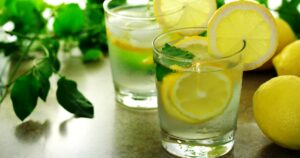
Lemon Water – AKA Sugar-Free Lemon-Aid – Drinking lemon water is great for the whole body. Did you know that the most alkaline-forming food you can eat is a lemon? Here is a simple way to get some quick alkalizing going into your body with this refreshing drink.
Make Your Own Olive Oil Lemon Juice Salad Dressing – This is a simple salad dressing base recipe that you can make up different each time with a variety of herbs or types of salty flavors.
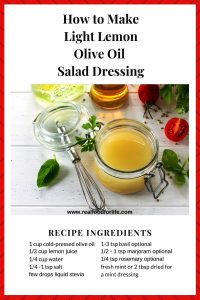 Light Herb Lemon Olive Oil Salad Dressing: It’s easier to make than to say it. Sugar-free and low calories. This light lemon olive oil salad dressing is a base recipe. What makes this light is the addition of water which also makes it more alkalizing. Also, get the health benefits of lemons too.
Light Herb Lemon Olive Oil Salad Dressing: It’s easier to make than to say it. Sugar-free and low calories. This light lemon olive oil salad dressing is a base recipe. What makes this light is the addition of water which also makes it more alkalizing. Also, get the health benefits of lemons too.
Avocado Tomato Salad Dressing – This ‘Avocado Tomato Salad Dressing’ is an easy way to jazz up any salad! This is a base recipe that you can alter with your choice of herbs or salty flavours. This is enough for three large salads.
Delicious Raspberry Dressing – Usually, this raspberry salad dressing is called a `vinaigrette’ but it does not have any vinegar in it. Vinegar is not an ingredient I use as it is so acidic and can be hard on the stomach. I use lemon juice which is healthier, alkaline-forming and is a nutrient-rich superfood. So I call it ‘Raspberry Salad Dressing’.
Powerful Anti-Inflammatory Salad Dressing – This salad dressing is full of 3 of the 12 Top Anti-Inflammatory Foods. Inflammation has been linked to major diseases such as Alzheimer’s, arthritis, cancer, diabetes, heart disease, and signs of aging.
Delicious Tomato Salad Dressing – This tomato salad dressing is a very light dressing recipe and is excellent for those wanting a low-fat dressing. It is always good to make your own salad dressing so you can use a nutritious oil, not too much salt, and no sugar. I have been making my own salad dressing for decades.
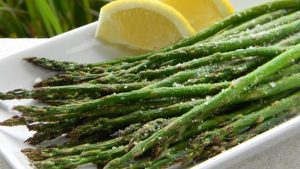
Asparagus with Lemon Juice: Two tasty superfoods together. If you like asparagus then you will enjoy this asparagus with lemon juice recipe. You will love how easy it is to make this healthy recipe that is a delicious addition to any meal.
Avocado Vegetable Dip – What I like about this raw avocado dip is that it is full of vegetables; adding the celery makes it crunchy and not so rich as well as healthier. It is low in sodium, monounsaturated fat and a good source of lutein, an antioxidant that may protect vision. Best of all it is fresh and tasty. I enjoy this mixture is on mixed green salads.
Start Using Lemons in Your Life Properly To Get The Health Benefits!
Lemon is one of the essential foods in the Alkalize Your Body BootCamp Also, learn how to use lemons properly in our Spring Cleanse.
I wrote a book that helps you understand the importance of an alkaline body and how to easily understand and implement these principles into your life.
Alkaline Diet Principles E-book – Acid / Alkaline Balance
Learn how an alkaline diet can easily and permanently create a fundamental chemical balance in your body that supports energy, weight management, healing, and total fitness.
This book contains the full description of the acid/alkaline balance and understanding it.
To follow, here is a course to help with good digestion:
Healthy Lean Boot Camp: Food Combining & Alkaline Balance for Regeneration & Healthy Slimness
100+ Superfoods
Learn more about some of the healthiest vegan nuts and seeds you will always want to have in your fridge or pantry
READ: Superfoods – Over 100 of the Healthiest Foods You Should Have in Your Diet and learn more about the variety of Superfoods we think you should have in your diet.

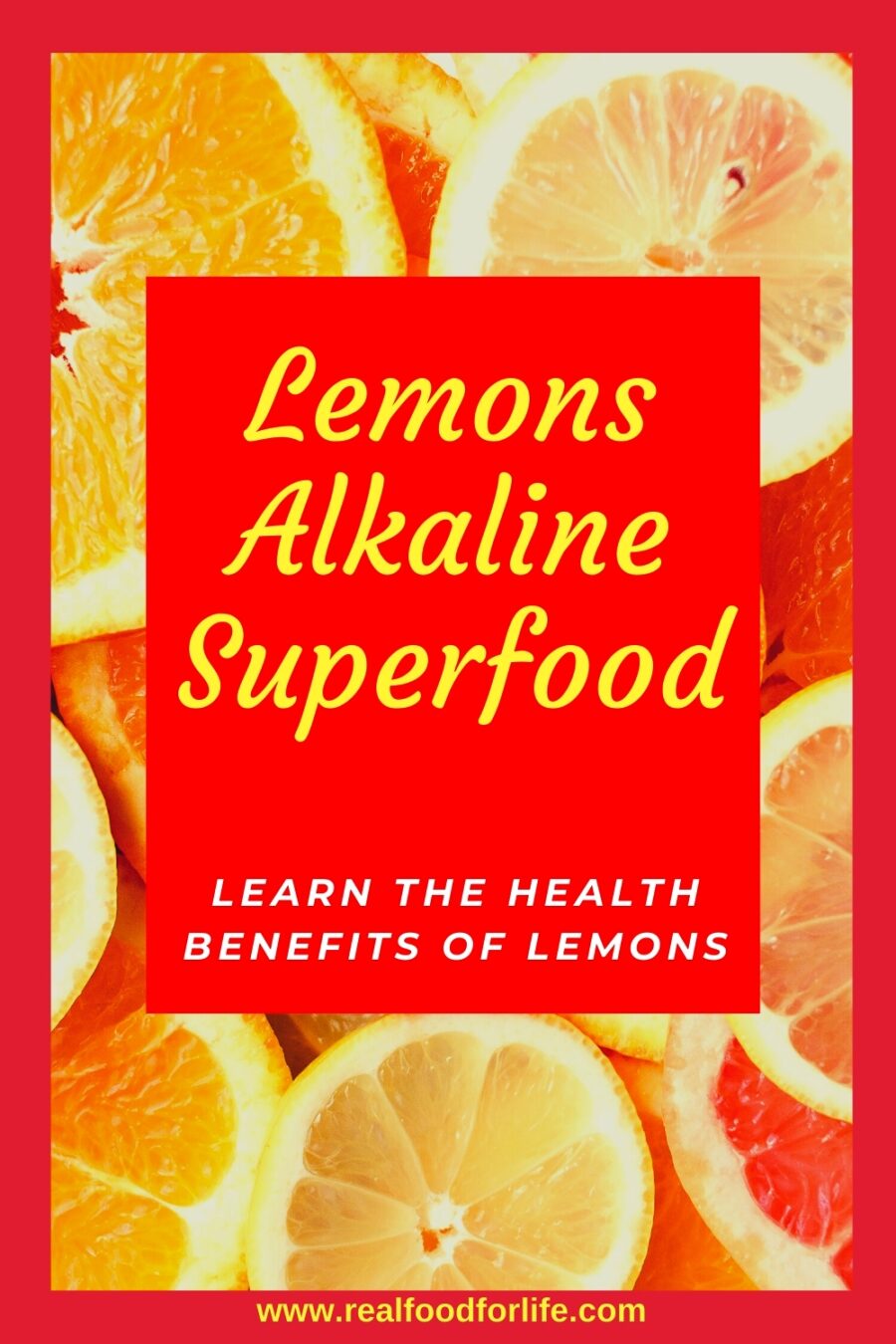
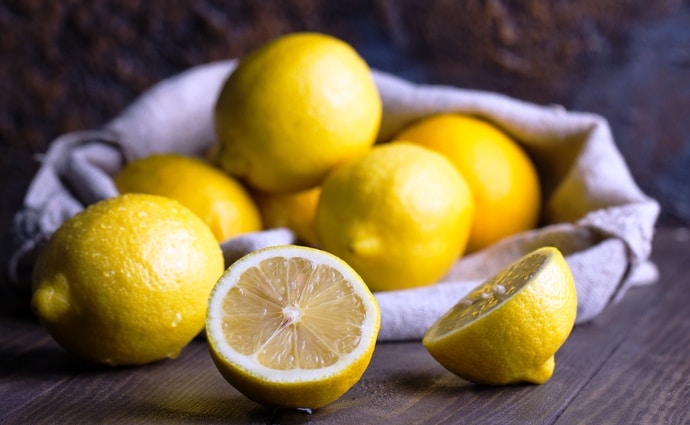


If i have ulcer, is it okay for me to drink one glass of lemon early in the morning before i’ll take my breakfast?
Raine, I am not qualified medically so I cannot say for sure. I am thinking that lemons start out being acid and turn to being alkaline forming so it may be harsh on a ulcer. You could try a few sips and see how that feels. Otherwise ask your doctor.
Fruits are some of the most beautiful creations of God and given to us for food. Humans have gathered wild fruits for food since the time of Adam and Eve.
Lemon is a great gift of God.
I am so glad I found your site. I really found you by mistake, while I was browsing on Bing for something else. Anyways I am here now and would just like to say thank you for a informative post and an all round inspiring blog. (I also love the theme/design), I don’t have time to read through it all at the moment, but I have added your website to my favorites, so when I have time I will be back to read more. Please do keep up the awesome job!
Thanks a lot for this info…It would be a great help…
can lemon juice help to prevent pregnancy and infections?
Really educated. Can lemom be added in a green smoothies
Yes, you can add lemon to green smoothies. I often do.
Is lemon juice concentrate as alkaline as fresh juice. I know fresh is best but I drink alot of lemon juice and water every day up to half gallon no sweetner. This would require a lot of lemons. I have been doing this for years along w/ apple cider vinegar. My ph is in the 7’s as per litmus test. Dave
Many use the Nutribullet. Does “pulverizing” a lemon, seeds and all, modify its alkaline content?
After chemo for breast cancer gr.1 I am taking Tamoxiden for 5 years. Can I also do the lemon thing?
Drinking lemon water and using lemons for your salad dressing is good for most people unless it interferes with your medication. Ask your doctor.
David, concentrated lemon juice is not as alkaline as fresh lemons but you seem to be doing well.
Joy, it would be so minimal that it is not something to be concerned about.
Thank you!
This was such a helpful site. I distributed the info to my elderly neighbors – one with Pakinson’s and the other with lung cancer. I drink lemon/honey/cayenne almost every day as I’ve had a small tumor in my breast for 5 years now. It hasn’t dissolved yet, but it also hasn’t grown, so I am still working on a completely natural resolution to it.
Question: I’ve been putting a lemon slice on my tumor for a few weeks now, as well as lemon oil. Do you think that this might eventually dissolve the tumor, or at least remove the cancer cells?
Thanks for any light you can shed on this.
Shelley Ervin
Shelley, I cannot answer your question as I am not a medical practitioner.
What I can say is that I have seen and heard of people doing intense detoxes and they have had stuff disappear.
Hi is there any difference between green melon and yellow melon ? Is the nutrition value the same ? Thank you for your time.
Richard, lemons and limes for sure taste different. Mostly the nutritional value is close except for the fact that lemons have more vitamin C. Also, lemons are higher in being alkaline forming.
Great Article
Thank you for the information 🙂
Hi,my sis was discovered with inguinal lympnodes .she was told is cancer and is affected liver.
Thank you for those vital health tips on lemon fruit.
My question is: I’ve been on hypertensive drugs for 10years. Can I go on lemon and gradually discontinue the B.P drugs?
This statement should be edited:
“the lemon is the ONLY food in the world that is Anionic (it’s electron has a negative charge). All other foods are cationic (it’s outer electron has positive charge.)”
Electrons, by nature, have a negative charge. Therefor, ALL foods in the world would be anionic by this statement. The definition of anionic is a molecule or compound (mixture of molecules) that has a net negative charge (i.e. more protons than electrons). An atom that has lost its outer electrons would have a higher balance of protons in the atomic nucleus, and would therefore be considered cationic.
Hi Diana,
Nice article. Very interesting.
However the bit about anionic etc. contains errors.
All electrons are negative.
Is it better to drink green lemon or yellow lemon with honey? Someone said that green is better as it’s not as acidic as the yellow one (Which is bad for your liver) how true is that?
I came across this good article when I was actually browsing for the health benefits of unpeeled lemon juice. This is because I recently juice green lemons without peeling them and mixed the juice of 2 lemons with hot water and 2 table spoons of olive oil. Consequently I had a better performance in my speech the next.i usually have speech disorders possibly linked with poor brain performance.
Maybe what you said about tengeretin in lemon peels is true!
I need more info about lemon peels health benefits.
thanks for the nice article!
Hi!
I’ve been aware of lemon water first thing in the morning as a terrific alkaline balancing tool. My question is, does pure essential lemon oil that is third party verified as organic and pure have the same effects? Since the oil is not consumed when squeezing fresh lemon juice. Or is a combination of the two the best method?
Thank you!
Nick
Hi Diana,
Thanks for the good work done,however malaria is not caused by bacteria as cited on point number 12.
correct, Malaria is a single cell parasite. Plasmodium
And I have it since the 1950’s and still be care full about
Comment…madam can i add lemon and honey together
Is lemon juice bad for a liver with active hep c
To Asamoah,
yes u can add honey to the lemon together…
I blend organic lemon peel into my Chummus, and the taste is wonderful, besides the awesome health properties!!
I also make fish burgers by mashing the canned wild caught salmon, some oat flour to bind it, and chopped garlic, and a tsp. of grated organic lemon peel. Then I form into burgers, and fry it in dark olive oil. Its healthful and delicious.
Read this from Kampala Uganda as I tried searching about my feeding habits.
I drink whole lemon tea(including fresh peelings) in the evening.
At least 250ml anhour before bed time. This has reduced my morning fatigue and improved my under bed sheet performance(sex drive).
I’m planning to increase my intake to two litres daily instead of whole fresh milk and see how the year goes.
I would like to try to buy organic lemons whenever possible, and organic lemons have not been very juicy compared to lemons from say “Mexico”, we enjoy lemonade from juicy the entire lemon minus seeds though. I wash the lemon with homemade vegetable cleaning spray (filtered water, lemon juice, white vinegar, and baking soda), should I be too concerned about the dry organic lemons versus the lemons by local farmers (aka Mexico)? I had been tried to removed the outer layer of skin too, from the local farmer’s lemons and then, juicing in heavy duty blender for about 1 minute.
Your article is well researched and written.
Loved the benefits of Lemon.
Thanks!
We take Lemons without knowing such benefits.
Thanks for Sharing such information with us.